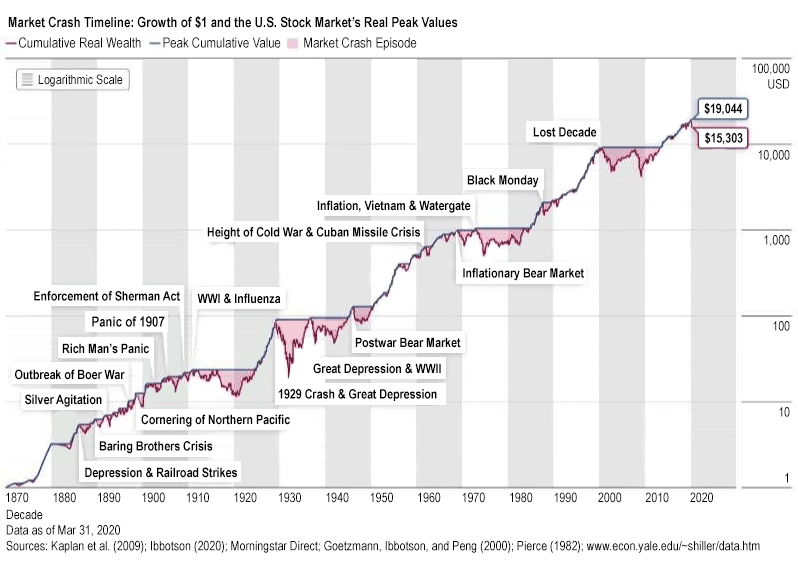Short Perspectives on this Manic Market
12 May 2020

We’re not even halfway through 2020, and yet we’ve already experienced so much disruption to our lives and to our investments. When the COVID-19 pandemic suddenly went global, it caused investors (and trading algorithms) to drastically revise their expectations. This led to the sell-off in February, followed by an utterly dismal March that saw markets hitting their lowest point this year on 23 March.
Then April came along – and surprised everyone by being one of the best months for global stocks in the past 33 years! That was despite the fact that news headlines continued to report even gloomier economic forecasts. What gives?
However, was it really that surprising after all? Perhaps April’s performance was not unprecedented, as markets continue to function as expected – i.e. by amalgamating the expectations of millions of investors around the world, based on all available information at a given time.
It provides further evidence for the points we have been reiterating, and which is especially pertinent at this time when fear reigns supreme:
- If you had panicked and sold off or reduced your equity allocation when markets collapsed in March, you would have missed out on one of the best months of the market in April. Instead of reducing your losses, you would have lost out on gains.
We saw something similar in 2008’s Great Financial Crisis. Many investors went to safe instruments (e.g. cash) after the sell-off, intending to preserve their capital. Nobody – not even governments, economists or market commentators – expected markets to bounce back so quickly. However, that seemingly rational act of trying to cut losses and preserve capital meant missing out on the sudden recovery in early 2009, which in turn extended the time needed for those investments to recover. This also affected “star fund managers”, as reported by Morningstar, where they showed how holding cash during a crisis made them heroes but the subsequent rally turned them to zeroes.
Missing just a few good days of returns permanently harms the ability of your investments to generate long-term returns. This is a valuable lesson gleaned from a long history of evidence and research. Paragraph 5 of this article clearly shows how detrimental it can be to miss just a few good days.
- During this period, we have been rebalancing your portfolios (instead of selling to cash) – a systematic market timing procedure where we buy more equity rather than sell. While it may seem counterintuitive, this actually makes your portfolio more robust and helps it recover more quickly.
Investors who fled to safety in March by selling to cash would now find themselves in the terrible position of trying to decide whether or not to enter the markets (after the swift double-digit rally from 23 March) or hold on a while longer. Some are hoping for a bigger sell-off so that they can utilise their cash and get back in at lower prices.
However, do keep in mind that stocks bottom before a recession ends. That means you need to invest when the news and information you’re getting is still really bad. By the time the good news appears, it would be too late – prices are already back up, and investors will be tripping over each other in their rush to get back into the markets.
Furthermore, no economist or strategist has been able to correctly predict the outcome of the economy over the past 50 years, as illustrated in paragraphs 4 and 5 in this article. This makes it decidedly unwise to base your investment decisions on such predictions.
- Despite what the media claims, the world – and global economy – has suffered through such dire circumstances before, and worse. We have experienced crisis after crisis, and yet innovation and the resilience of the human spirit have always managed to shine through and overcome the adversities we face.
This is also true of the markets, as seen in this chart showing the growth of $1 over time and through countless disasters.

There have undoubtedly been tough periods in the past, and we are in one of them now. However, we have always come back stronger; as this true story perfectly illustrates.
Don’t let your emotions, economists or market commentators dictate your decisions.
Lastly, do yourself a favour and read this timeless and insightful short article that Warren Buffett wrote in 1988 for the New York Times, where he perfectly describes how “Mr. Market” works.
Mr. Market is now as manic as it has been in the past and will be in the future. To quote Mr. Buffett: “But, like Cinderella at the ball, you must heed one warning or everything will turn into pumpkins and mice: Mr. Market is there to serve you, not to guide you. It is his pocketbook, not his wisdom, that you will find useful.”
#
If you have found this article useful and would like to schedule a complimentary session with one of our advisers, you can click the button below or email us at customercare@gyc.com.sg.
IMPORTANT NOTES: All rights reserved. The above article or post is strictly for information purposes and should not be construed as an offer or solicitation to deal in any product offered by GYC Financial Advisory. The above information or any portion thereof should not be reproduced, published, or used in any manner without the prior written consent of GYC. You may forward or share the link to the article or post to other persons using the share buttons above. Any projections, simulations or other forward-looking statements regarding future events or performance of the financial markets are not necessarily indicative of, and may differ from, actual events or results. Neither is past performance necessarily indicative of future performance. All forms of trading and investments carry risks, including losing your investment capital. You may wish to seek advice from a financial adviser before making a commitment to invest in any investment product. In the event you choose not to seek advice from a financial adviser, you should consider whether the investment product is suitable for you. Accordingly, neither GYC nor any of our directors, employees or Representatives can accept any liability whatsoever for any loss, whether direct or indirect, or consequential loss, that may arise from the use of information or opinions provided.









